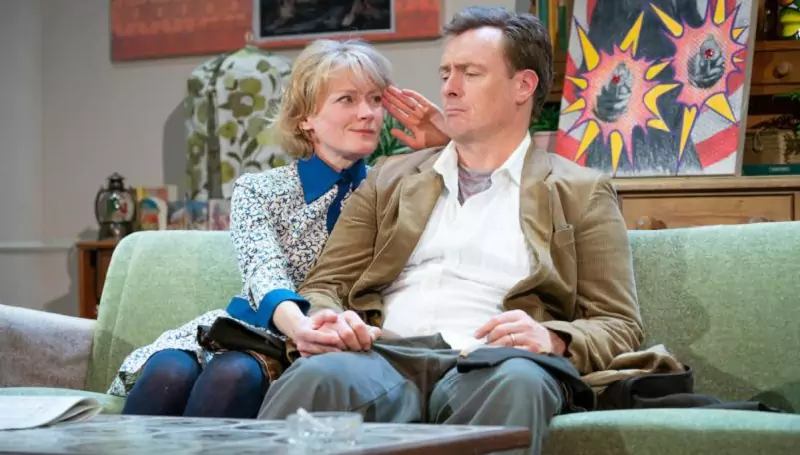A Day in the Death of Joe Egg (Trafalgar Studios)
Jo Briggs in central London
In his 1927 essay on humour, Sigmund Freud considered the ways in which comedy might provide rescue from the brink of despair. We laugh, he said, because our inner self refuses to accept reality; instead of being overwhelmed by the disjunction between hope and harsh or unbearable fact, we make jokes about it. So, the worse life gets, the funnier it is: except when, occasionally, reality breaks in.
Peter Nichols’ semi-autobiographical, taboo-breaking play A Day in the Death of Joe Egg — first staged to great acclaim in 1967 — is full of such black humour. lt is a situation comedy about what appears to be an overwhelming family tragedy, as well as being an exercise in theatre comedy technique. The action takes place on a December evening in the living room of schoolteacher Bri and stay-at-home carer Sheila, who are the parents of a profoundly disabled daughter, Josephine or “Joe Egg”.
The living room set, designed by Peter McKintosh, is built inside a huge wooden container on castors, which revolves at the beginning of Act One to reveal a late 1960s domestic interior. The set allows Bri, and to a lesser extent Sheila, to step out of their claustrophobic home life onto the bare stage, to sit on its edge and speak directly to the audience, and even to roll it away so they can express themselves freely in a neutral place outside reality. In this liminal space, Bri rails against classrooms of recalcitrant teenagers and riffs on the sexual frustrations inherent in his home life. Bri and Sheila together improvise comic scenes from the past, through which they tell the story of Joe Egg’s birth, childhood, and lifelong dependency.
Back inside the room, Bri and Sheila engage in a fantasy dialogue that gives Joe Egg an imagined voice, investing her with interests, opinions, and comic characteristics, while they spar with each other as a way of achieving a kind of intimacy. It is also patently a mechanism for coping with unbearable stress.
ln Act Two, the arrival of acquaintances Freddie and Pam, and then Bri’s mother Grace, forces Bri into a painful confrontation with his ambivalent feelings about Joe Egg. As Bri breaks down and becomes more unstable, gentle Sheila emerges as the long-suffering caretaker to them both.
A Day in the Death of Joe Egg was written at a time when people with disabilities in the UK and elsewhere were often hidden away in institutions, and many believed them to be a source of embarrassment and shame for their families. This most recent revival of the play, directed by Simon Evans, has kept the story in its original period, probably because the attitudes to people with disabilities that drive the dialogue would be anachronistic in a present-day setting; in particular, some of the language used by Pam and Freddie is now unacceptable and very hard to endure.
The casting of twenty-six-year-old Storme Toolis (an actor with cerebral palsy) to play the role of fifteen-year old Joe Egg has added an additional dimension to the piece and given it more contemporary relevance: her presence as a member of the acting ensemble, as well as the expansion of the role to a speaking part, helps to mediate the experience of old-fashioned prejudice. Such casting decisions may well give the play greater longevity in the era of disability rights, affirmative action, and inclusion.
Toby Stephens and Claire Skinner give perfectly balanced performances as Bri and Sheila, a couple forced apart by the hopes and frustrations associated with loving and caring for Joe Egg. Patricia Hodge has a classy comic cameo as the conventional, emotionally remote Grace.
Nichols was inspired to write A Day in the Death Joe Egg by his own experiences as the young father of a girl with severe cerebral palsy, who died aged only eleven. Last seen in London in 2001-2 (in a West End production directed by Laurence Boswell, starring Victoria Hamilton and Clive Owen/Eddie Izzard, which transferred to Broadway), it remains Nichols’s best-known play. Overall, this new production is a fitting tribute to a playwright unjustly neglected in his later career, who died shortly before the opening of the show, aged ninety-two.









